Readings
This page contains recommened readings divided into sections and area of interest. This list is by no means an exhaustive list of reference materials for AI. We believe this is a rich foundation for better understanding and engaging with AI.
Latest Additions
Computers and Education: Artifical Intelligence (Volume 9, open access, 2025)
Critical GenAI Literacy: Postdigital Configurations (open access, 2025).
When combinations of humans and AI are useful: A systematic review and meta-analysis (2024)
By Michelle Vaccaro, Abdullah Almaatouq, and Thomas Malone
Trustworthy Artificial Intelligence: Comprehensible, Transparent and Correctable (2023)
By Ute Schmid
Topics in AI
Generative AI for Finding Data (PDF)
By Todd Quinn, University of New Mexico.
NOTE: Some of the responses provide hallucinations.
Student Guide to Artificial Intelligence
From Elon University
AI and Academia: The End of the Essay? (video)
By Daniel Lametti
AI Text Generators Clearinghouse
Compiled by Anna Mills, the Writing Across the Curriculum Clearinghouse, Colorado State University
A Generative AI Primer (Educause)
By Brian Basgen, CIO Emerson College
ChatGPT & Education
By Torrey Trust, College of Education, University of Massachusetts, Amherst
ChatGPT: Understanding the new landscape and short-term solutions
By Cynthia Alby
ChatGPT Advice Academics Can Use Now
By Susan D'Agostino, Inside Higher Ed
ChatGPT Goes to Law School
By Jonathan H. Choi, Kristin E. Hickman, Amy Monahan, and Daniel B. Schwarcz,(January 23, 2023).
Minnesota Legal Studies Research Paper No. 23-03
ChatGPT Has Colleges in Emergency Mode to Shield Academic Integrity
By Jeffrey R. Young, EdSurge
ChatGPT or: How I Learned to Stop Worrying and Love Generative AI
By John Orland, The Teaching Professor
Freaking Out About ChatGPT—Part I
By John Warner, Inside Higher Ed 6 (2022)
Three Things to Know about AI Tools and Teaching
By Derek Bruff
Using Early Responses to Wikipedia and Google to Consider ChatGPT
By David Hurley
Artifical Intelligence: A Guide for Thinking Humans
By Melanie Mitchell (2019)
Critical Questions about Technology
We encourage you to approach chatbot tools with a critical lens before structuring course assignments with these tools. Some students may be unaware of these tools and what they can do, and others may only be thinking about how they can benefit from the tool.
ChatGPT and Assessment
by Ean Henninger, UNM Office of Assessment
Teaching With and About AI
By Lori Townsend, University Libraries
A Teacher's Prompt Guide to ChatGPT
Created by Centre for Education Statistics and Evaluation, New South Wales, Australia
Teaching with AI Handouts / Templates
From José Antonio Bowen and C. Edward Watson
Cheating Lessons: Learning from Academic Dishonesty by James M. Lang (2013)
Lang's provocative new research indicates that students often cheat because their learning environments give them ample incentives to try, and that strategies which make cheating less worthwhile also improve student learning.
Physical Book (avaiable in Zimmerman Library: Third Floor - LB3609 .L275 2013)
Ebook (avaiable with UNM creditials)
PDF (avaiable with UNM creditials)
Information Experience and Information Literacy by Serap Kurbanoğlu et al (2023)
The two-volume set CCIS 2042 and 2043 constitutes the refereed proceedings of the 8th European Conference on Information Literacy, ECIL 2023, held in Kraków, Poland, in October 2023.
The 47 full papers presented in these proceedings were carefully reviewed and selected from 182 submissions. The papers have been organized in the following topical sections: algorithms, artificial intelligence and information literacy; data literacy and digital literacy; information experience and information behaviour; policy, strategies, frameworks, research and different approaches; credibility, ethics, challenges and new paths; and information literacy instruction and education.
PDF (avaiable with UNM creditials)
How to Prevent ChatGPT Cheating
By Erik Ofgang, Teaching & Learning
What are We Doing About AI Essays?
By Miriam Bowers-Abbott, Faculty Focus
My AI Safety Lecture for UT Effective Altruism
Shtetl-Optimized: The blog of Scott Aaronson, Scott Aaronson, 2022
AI Writing: The challenge and opportunity in front of education now
Turnitin, Chris Caren, 2022
Sneak preview of Turnitin's AI writing and ChatGPT detection capability
Turnitin, Annie Chechitelli, 2023
OpenAI's attempts to watermark AI text hit limits
TechCrunch, Kyle Wiggers, 2022
Algorithms of Oppression by Safiya Umoja Noble (2018)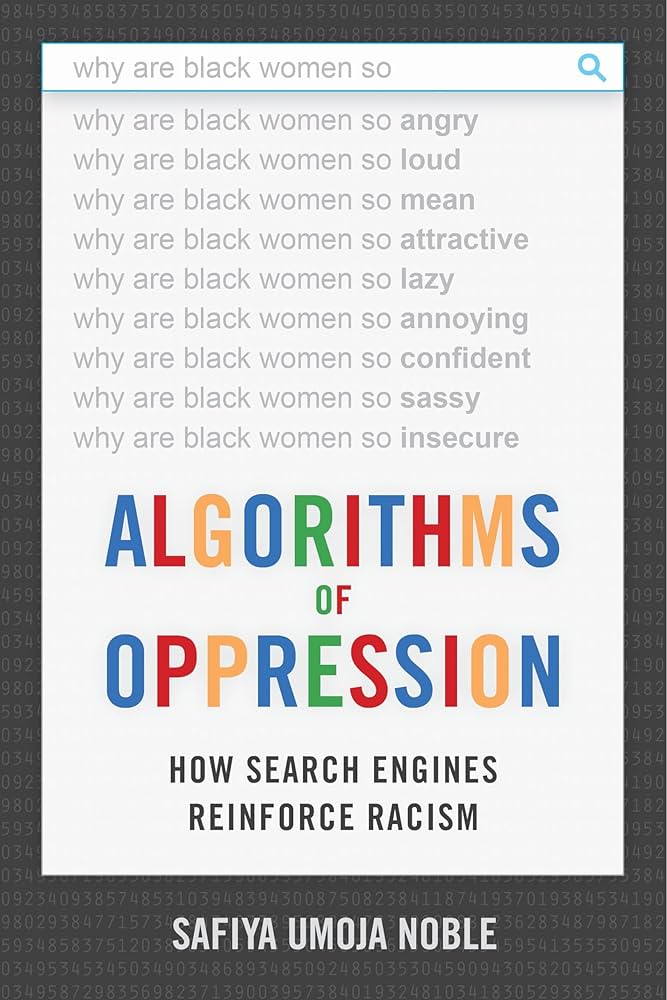
Noble challenges the idea that search engines like Google offer an equal playing field for all forms of ideas, identities, and activities. Data discrimination is a real social problem. Noble argues that the combination of private interests in promoting certain sites, along with the monopoly status of a relatively small number of Internet search engines, leads to a biased set of search algorithms that privilege whiteness and discriminate against people of color, especially women of color. Through an analysis of textual and media searches as well as extensive research on paid online advertising, Noble exposes a culture of racism and sexism in the way discoverability is created online.
Physical Book (avaiable in Zimmerman Library: Basement & Third Floor -
ZA4230 .N63 2018)
Ebook (avaiable with UNM creditials)
PDF (avaiable with UNM creditials)
Weapons of Math Destruction by Cathy O'Neil (2016) 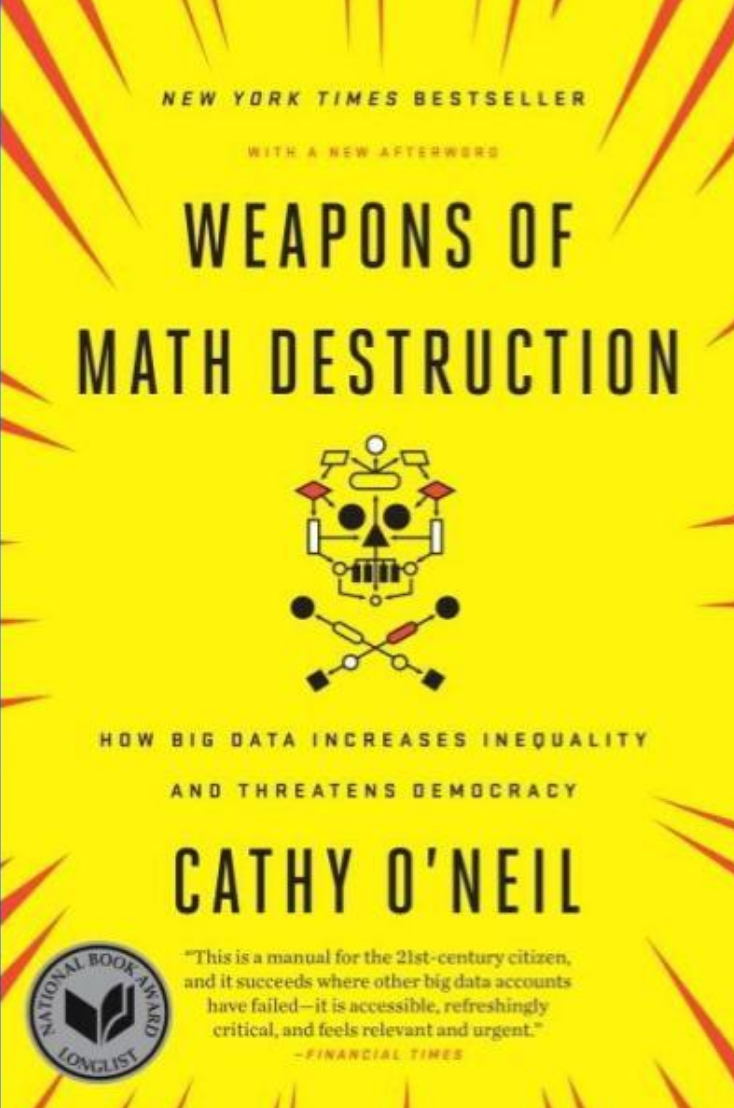
O'Neil reveals in this book how he models being used today are opaque, unregulated, and uncontestable, even when they are wrong. Most troubling, they reinforce discrimination: if a poor student can't get a loan because a lending model deems them too risky (by virtue of their zip code), they are then cut off from the kind of education that could pull them out of poverty, and a vicious spiral ensues. Models are propping up the lucky and punishing the downtrodden, creating a 'toxic cocktail for democracy.' Tracing the arc of a person's life, O'Neil exposes the black box models that shape our future, both as individuals and as a society. These 'weapons of math destruction' score teachers and students, sort résumés, grant (or deny) loans, evaluate workers, target voters, set parole, and monitor our health. O'Neil calls on modelers to take more responsibility for their algorithms and on policy makers to regulate their use. But in the end, it is up to us to become more savvy about the models that govern our lives.
Physical Book (avaiable in Centennial Library: Lower Level 2 - QA76.9.B45 O64 2016)
Artificial Intelligence: Ethical, Social, and Security Impacts for the Present
and the Future by Julie Mehan (2024)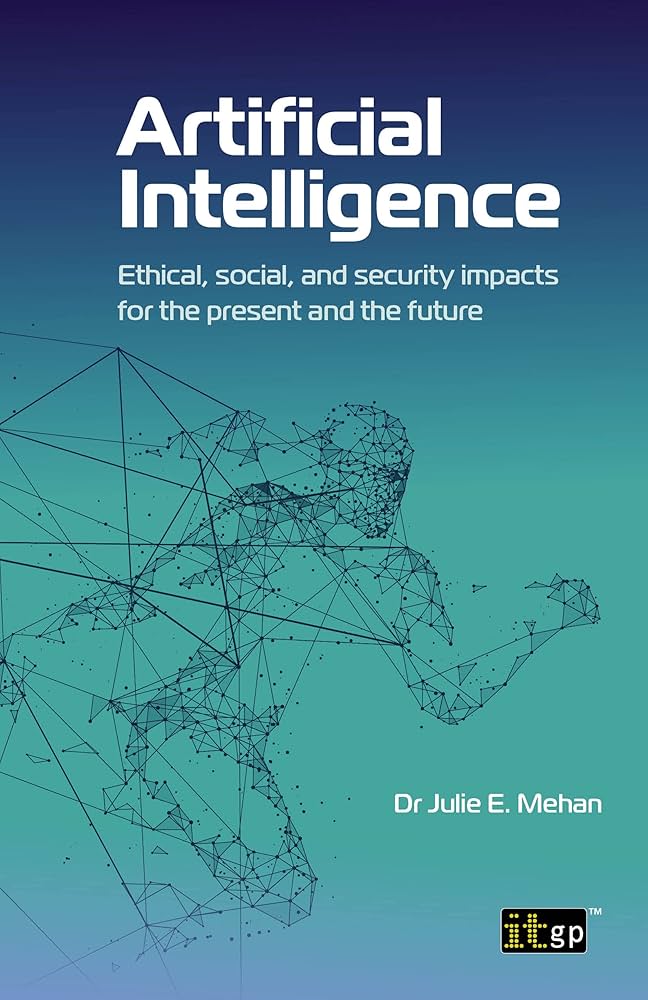
A global perspective on AI. There are untold how-to books on AI technology, replete with methods to improve and advance the statistics and algorithms of AI; however, the social, ethical and security impacts are often at best a secondary consideration – if discussed at all.
This book explores the complex topic of AI ethics in a cross-functional way, alternating between theory and practice. Practical and recent events, and their associated challenges, are presented, such as the collateral effects of the COVID-19 pandemic on the application of AI technologies. The book also gives an up-to-date overview of the potential positive and negative outcomes of AI implementations together with an analysis of AI from an ethical perspective.
Ebook (avaiable with UNM creditials)
Towards a Code of Ethics for Artifical Intelligence by Paula Boddington (2017)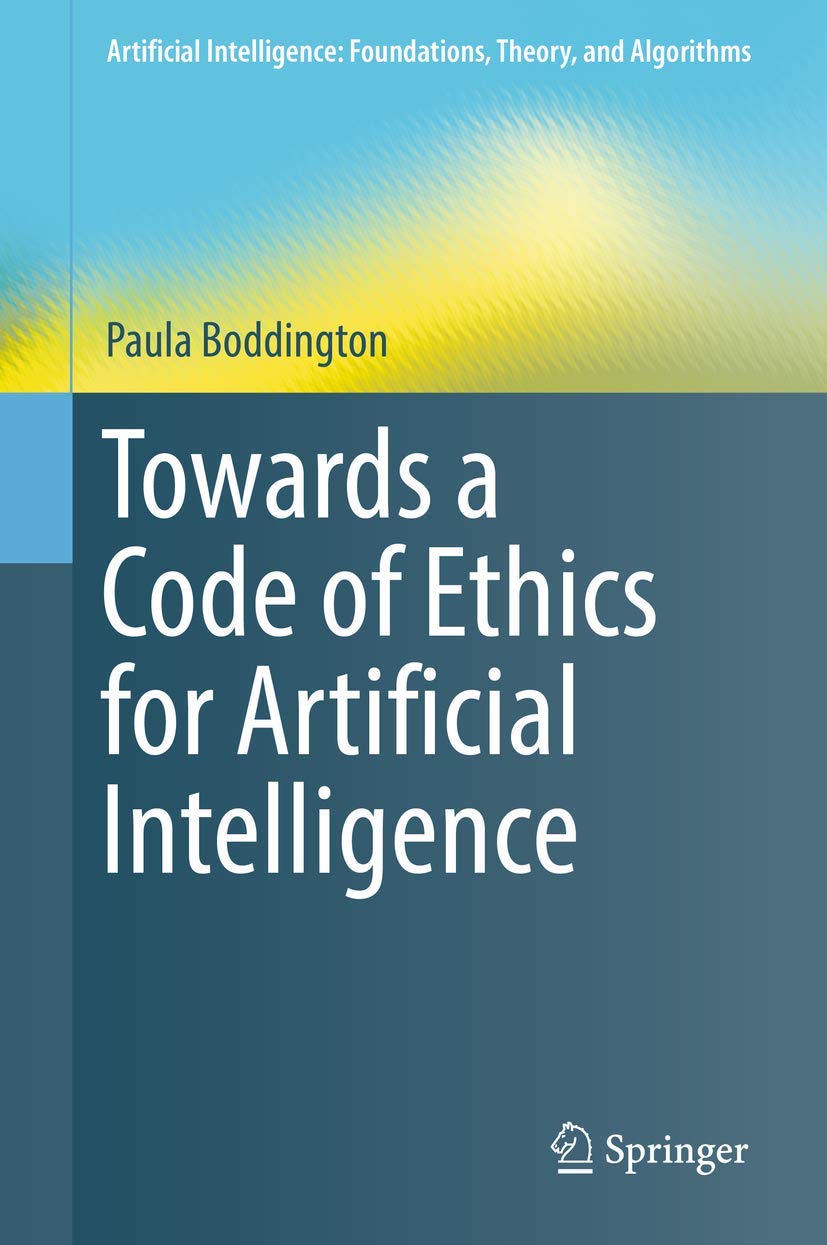
Boddington investigates how to produce realistic and workable ethical codes or regulations in this rapidly developing field to address the immediate and realistic longer-term issues facing us. She spells out the key ethical debates concisely, exposing all sides of the arguments, and addresses how codes of ethics or other regulations might feasibly be developed, looking for pitfalls and opportunities, drawing on lessons learned in other fields, and explaining key points of professional ethics. The book provides a useful resource for those aiming to address the ethical challenges of AI research in meaningful and practical ways.
Ebook (avaiable with UNM creditials)
Robot Ethics 2.0: From autonomous cars to artificial intelligence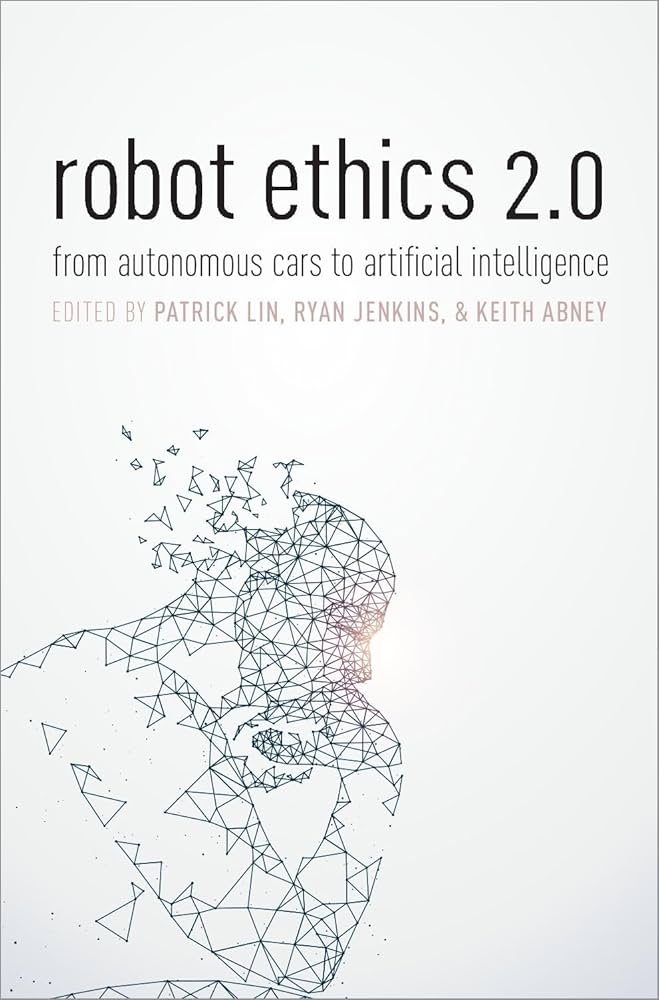
Edited by Patrick Lin, Ryan Jenkins, and Keith Abney (2017)
As robots slip into more domains of human life--from the operating room to the bedroom--they take on our morally important tasks and decisions, as well as create new risks from psychological to physical. This makes it all the more urgent to study their ethical, legal, and policy impacts. To help the robotics industry and broader society, we need to not only press ahead on a wide range of issues, but also identify new ones emerging as quickly as the field is evolving. For instance, where military robots had received much attention in the past (and are still controversial today), this volume looks toward autonomous cars here as an important case study that cuts across diverse issues, from liability to psychology to trust and more. And because robotics feeds into and is fed by AI, the Internet of Things, and other cognate fields, robot ethics must also reach into those domains, too. Expanding these discussions also means listening to new voices; robot ethics is no longer the concern of a handful of scholars. Experts from different academic disciplines and geographical areas are now playing vital roles in shaping ethical, legal, and policy discussions worldwide.
Physical Book (avaiable in Centennial Library: Lower Level 2 - TJ211.49 .R6222 2017)
AI Ethics: Seven Traps
By Annette Zimmermann and Bendert Zevenbergen, Freedom to Tinker
Artificial intelligence (AI) ethics: ethics of AI and ethical AI
Siau, Keng, and Weiyu Wang. Journal of Database Management (JDM) 31.2 (2020): 74-87.
Artificial Intelligence and Life in 2030: The One Hundred Year Study on Artificial Intelligence
In September 2016, Stanford's "One Hundred Year Study on Artificial Intelligence" project (AI100) issued the first report of its planned long-term periodic assessment of artificial intelligence (AI) and its impact on society. It was written by a panel of 17 study authors, each of whom is deeply rooted in AI research, chaired by Peter Stone of the University of Texas at Austin.
The Ethical Framework for AI in Education
The Institute for Ethical Al in Education, University of Buckingham
The Ethics of Artificial Intelligence
Nick Bostrom and Eliezer Yudkowsky. Artificial intelligence safety and security. Chapman and Hall/CRC, 2018. 57-69.
The Global Landscape of AI Ethics Guidelines
Jobin, Anna, Marcello Ienca, and Effy Vayena. Nature Machine Intelligence 1.9 (2019): 389-399.
You Look like a Thing and I Love You: How Artifical Intelligence Works and Why It's Making the World a Weirder Place by Janelle Shane (2022)
 "You look like a thing and I love you" is one of the best pickup lines ever . . . according to an artificial intelligence trained by scientist Janelle Shane, creator of the popular blog AI Weirdness. She creates silly AIs that learn how to name paint colors, create the best recipes, and even flirt (badly) with humans—all to understand the technology that governs so much of our daily lives. We rely on AI every day for recommendations, for translations, and to put cat ears on our selfie videos. We also trust AI with matters of life and death, on the road and in our hospitals. But how smart is AI really... and how does it solve problems, understand humans, and even drive self-driving cars? Shane delivers the answers to every AI question you've ever asked, and some you definitely haven't. Like, how can a computer design the perfect sandwich? What does robot-generated Harry Potter fan-fiction look like? And is the world's best Halloween costume really "Vampire Hog Bride"? In this smart, often hilarious introduction to the most interesting science of our time, Shane shows how these programs learn, fail, and adapt—and how they reflect the best and worst of humanity.
"You look like a thing and I love you" is one of the best pickup lines ever . . . according to an artificial intelligence trained by scientist Janelle Shane, creator of the popular blog AI Weirdness. She creates silly AIs that learn how to name paint colors, create the best recipes, and even flirt (badly) with humans—all to understand the technology that governs so much of our daily lives. We rely on AI every day for recommendations, for translations, and to put cat ears on our selfie videos. We also trust AI with matters of life and death, on the road and in our hospitals. But how smart is AI really... and how does it solve problems, understand humans, and even drive self-driving cars? Shane delivers the answers to every AI question you've ever asked, and some you definitely haven't. Like, how can a computer design the perfect sandwich? What does robot-generated Harry Potter fan-fiction look like? And is the world's best Halloween costume really "Vampire Hog Bride"? In this smart, often hilarious introduction to the most interesting science of our time, Shane shows how these programs learn, fail, and adapt—and how they reflect the best and worst of humanity.
Physical Book (avaiable through Interlibrary Loan)
Physical Book (avaiable through Interlibrary Loan)
How to survive a robot invasion: rights, responsibility, and AI by David J. Gunkel (2020)
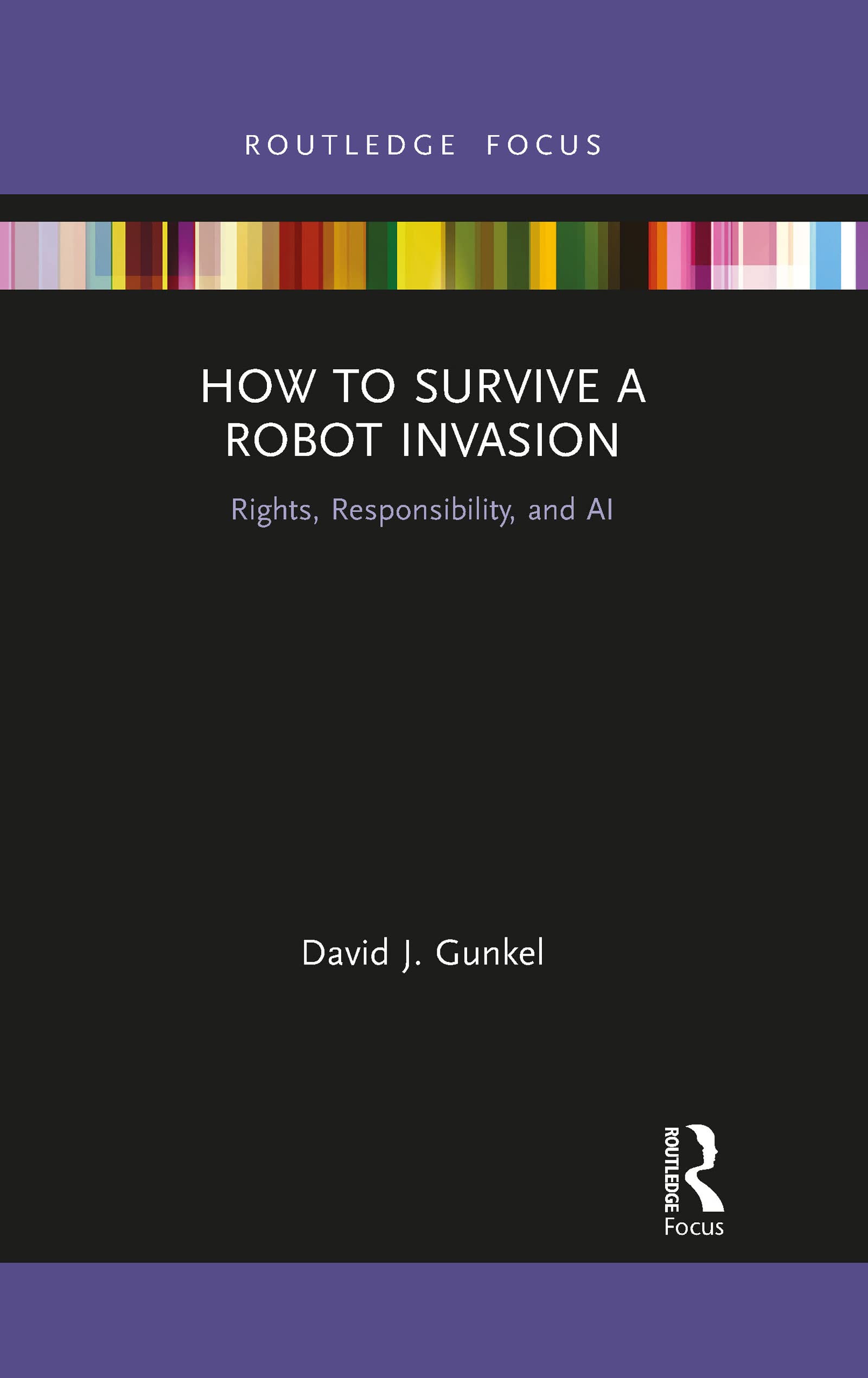 In this short introduction, David J. Gunkel examines the shifting world of artificial intelligence, mapping it onto everyday twenty-first century life and probing the consequences of this ever-growing industry and movement. The book investigates the significance and consequences of the robot invasion in an effort to map the increasingly complicated social terrain of the twenty-first century. Whether we recognize it as such or not, we are in the midst of a robot invasion. What matters most in the face of this machine incursion is not resistance, but how we decide to make sense of and respond to the social opportunities and challenges that autonomous machines make available. How to Survive a Robot Invasion is a fascinating and accessible volume for students and researchers of new media, philosophy of technology, and their many related fields. It aims both to assist readers' efforts to understand a changing world and to provide readers with the critical insight necessary for grappling with our science fiction-like future.
In this short introduction, David J. Gunkel examines the shifting world of artificial intelligence, mapping it onto everyday twenty-first century life and probing the consequences of this ever-growing industry and movement. The book investigates the significance and consequences of the robot invasion in an effort to map the increasingly complicated social terrain of the twenty-first century. Whether we recognize it as such or not, we are in the midst of a robot invasion. What matters most in the face of this machine incursion is not resistance, but how we decide to make sense of and respond to the social opportunities and challenges that autonomous machines make available. How to Survive a Robot Invasion is a fascinating and accessible volume for students and researchers of new media, philosophy of technology, and their many related fields. It aims both to assist readers' efforts to understand a changing world and to provide readers with the critical insight necessary for grappling with our science fiction-like future.
Ebook (avaiable with UNM creditials)
Empire of AI: Dream and Nightmares in Sam Altman's OpenAI by Karen Hao (2025)
 When AI expert and investigative journalist Karen Hao first began covering OpenAI in 2019, she thought they were the good guys. Founded as a nonprofit with safety enshrined as its core mission, the organization was meant, its leader Sam Altman told us, to act as a check against more purely mercantile, and potentially dangerous, forces. What could go wrong? Over time, Hao began to wrestle ever more deeply with that question. Armed with Microsoft's billions, OpenAI is setting a breakneck pace, chased by a small group of the most valuable companies in human history--toward what end, not even they can define. All this time, Hao has maintained her deep sourcing within the company and the industry, and so she was in intimate contact with the story that shocked the entire tech industry--Altman's sudden firing and triumphant return. The behind-the-scenes story of what happened, told here in full for the first time, is revelatory of who the people controlling this technology really are. But this isn't just the story of a single company, however fascinating it is. By drawing on the viewpoints of Silicon Valley engineers, Kenyan data laborers, and Chilean water activists, Hao presents the fullest picture of AI and its impact we've seen to date, alongside a trenchant analysis of where things are headed. An astonishing eyewitness view from both up in the command capsule of the new economy and down where the real suffering happens, Empire of AI pierces the veil of the industry defining our era
When AI expert and investigative journalist Karen Hao first began covering OpenAI in 2019, she thought they were the good guys. Founded as a nonprofit with safety enshrined as its core mission, the organization was meant, its leader Sam Altman told us, to act as a check against more purely mercantile, and potentially dangerous, forces. What could go wrong? Over time, Hao began to wrestle ever more deeply with that question. Armed with Microsoft's billions, OpenAI is setting a breakneck pace, chased by a small group of the most valuable companies in human history--toward what end, not even they can define. All this time, Hao has maintained her deep sourcing within the company and the industry, and so she was in intimate contact with the story that shocked the entire tech industry--Altman's sudden firing and triumphant return. The behind-the-scenes story of what happened, told here in full for the first time, is revelatory of who the people controlling this technology really are. But this isn't just the story of a single company, however fascinating it is. By drawing on the viewpoints of Silicon Valley engineers, Kenyan data laborers, and Chilean water activists, Hao presents the fullest picture of AI and its impact we've seen to date, alongside a trenchant analysis of where things are headed. An astonishing eyewitness view from both up in the command capsule of the new economy and down where the real suffering happens, Empire of AI pierces the veil of the industry defining our era
Physical Book (avaiable in Centennial Library: Lower Level 2 - Q334.7 .H36 2025)
Generative AI Expert Playlist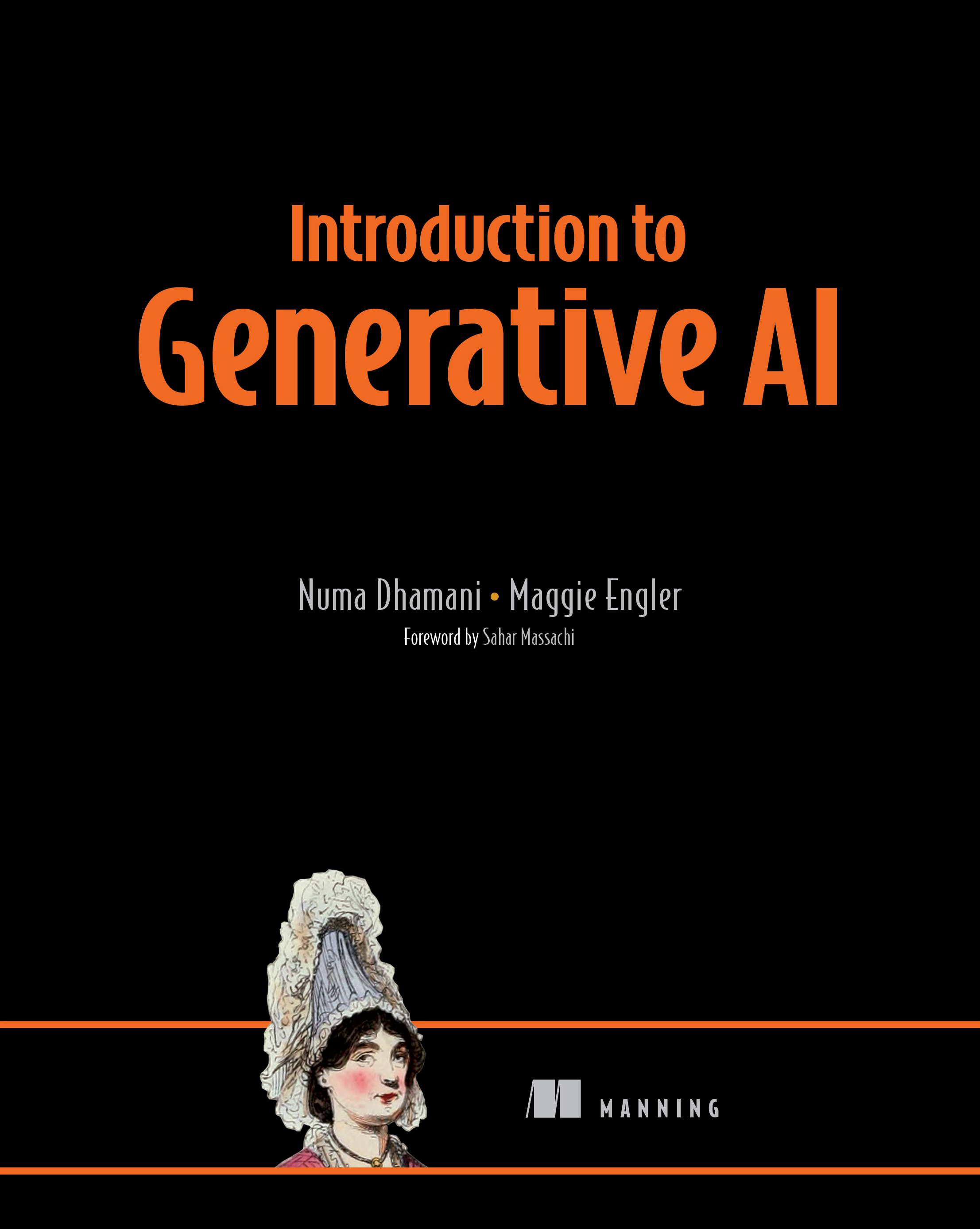
By O'Reilly Media Editorial (2021-2024)
Generative AI is transforming how we tackle everyday tasks like searching the internet, composing texts, and creating images. This playlist of resources will help you develop the GenAI knowledge you'll need to meet this moment, both on the job and off.
Artifical Intelligence: A Very Short Introduction by Margaret A. Boden (2018)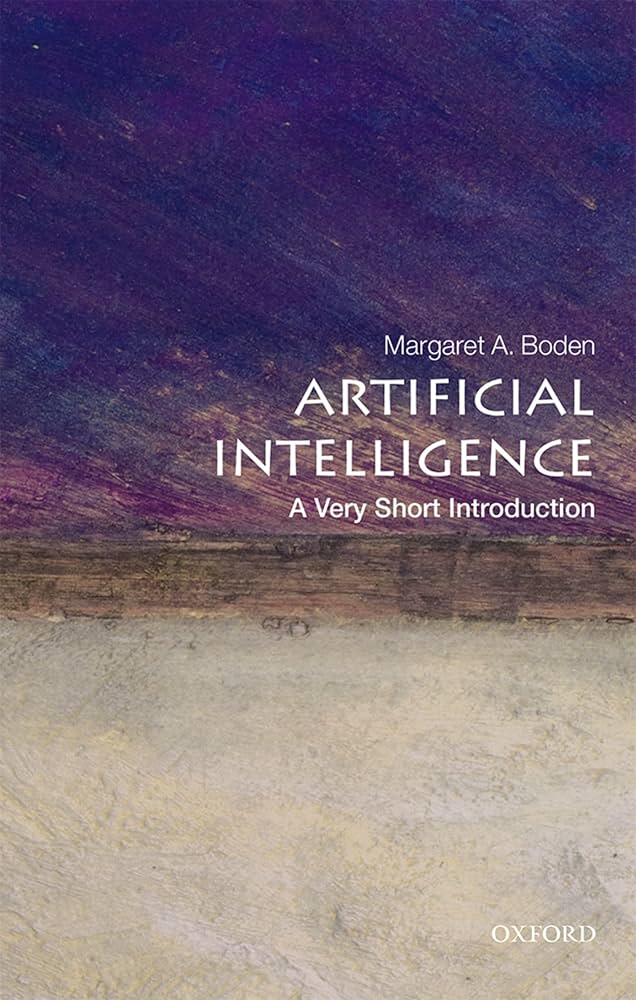
The applications of Artificial Intelligence lie all around us and affect all aspects of our lives. The results of Artificial Intelligence have been invaluable to biologists, psychologists, and linguists in helping to understand the processes of memory, learning, and language from a fresh angle. As a concept, Artificial Intelligence has fuelled and sharpened the philosophical debates concerning the nature of the mind, intelligence, and the uniqueness of human beings. Artificial Intelligence: A Very Short Introduction considers the history of Artificial Intelligence, its successes, its limitations, and its future goals. It also reviews the philosophical and technological challenges raised by Artificial Intelligence, considering whether programs could ever be really intelligent, creative, or even conscious.
Ebook (avaiable with UNM creditials)
Artifical Intelligence: A Guide for Thinking Humans by Melanie Mitchell (2019)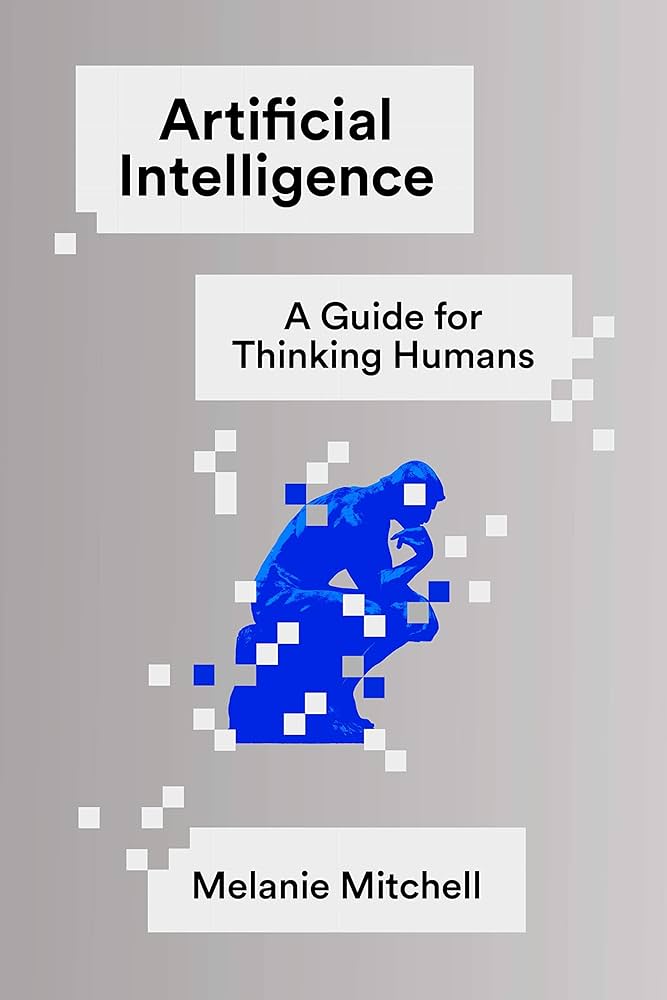
Melanie Mitchell, a leading computer scientist, now reveals AI's turbulent history and the recent spate of apparent successes, grand hopes, and emerging fears surrounding it. In Artificial Intelligence, Mitchell turns to the most urgent questions concerning AI today: How intelligent--really--are the best AI programs? How do they work? What can they actually do, and when do they fail? How humanlike do we expect them to become, and how soon do we need to worry about them surpassing us? Along the way, she introduces the dominant models of modern AI and machine learning, describing cutting-edge AI programs, their human inventors, and the historical lines of thought underpinning recent achievements. She explores the profound disconnect between the hype and the actual achievements in AI, providing a clear sense of what the field has accomplished and how much further it has to go. This frank, lively book is an indispensable guide to understanding today's AI, its quest for "human-level" intelligence, and its impact on the future for us all.
Physical Book (avaiable in Centennial Library: Lower Level 2 - Q335 .M58 2019)
Artifical Intelligence: Rise of the Lightspeed Learners by Charles Jennings (2019)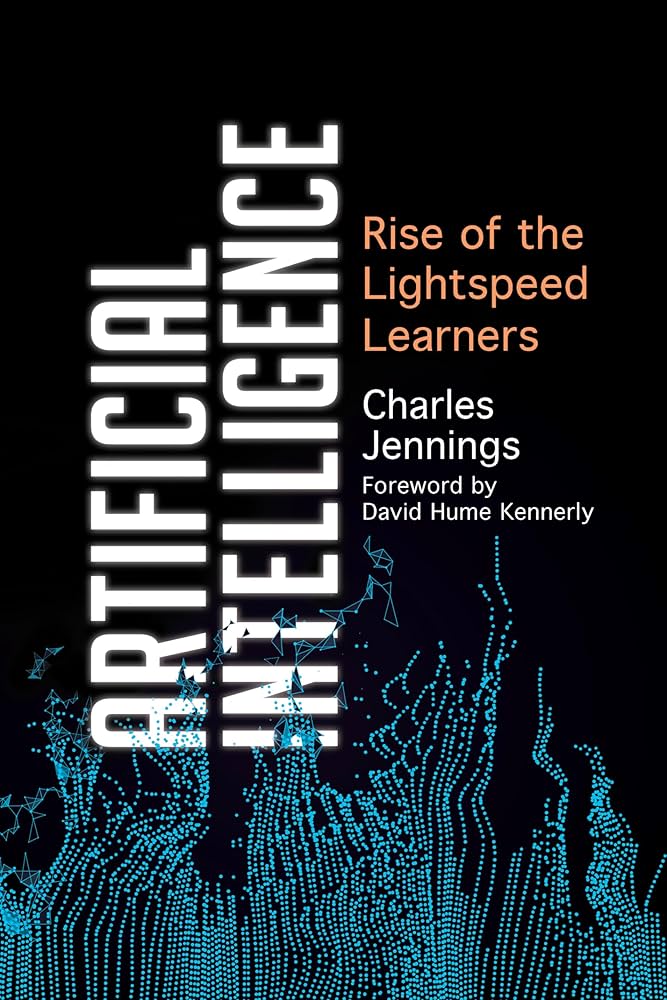
AIs bring huge promise, but also existential risk. The biggest risk isn't killer robots--it's the renegade leaders, despots, and unrestrained hackers everywhere we should worry about. Charles Jennings' insightful new book, Artificial Intelligence: The Rise of the Lightspeed Learners presents sides of AI most people have never even considered before. That surprises are a main product of AIs. That AI cybersecurity is much more critical than traditional IT security. Jennings blends insights into Silicon Valley, Washington D.C., and Beijing with insider AI stories, irreverent humor and strong opinions. He explores the global AI ecosystem from Cambridge to Beijing; and provides a stark assessment of AI activity in China--where he lived for two years working with senior government officials. He claims that the U.S. and China are in an AI horserace that will be the most important technology contest ever, with the outcome still very much in doubt. Consisting of stories, musings, interviews, and more, it provides a timely and accessible explanation of AI and its key issues to the general reading public
Physical Book (avaiable in Centennial Library: Lower Level 2 - Q335 .J45 2019)
Artifical Intelligence: Evolution, Ethics, and Public Policy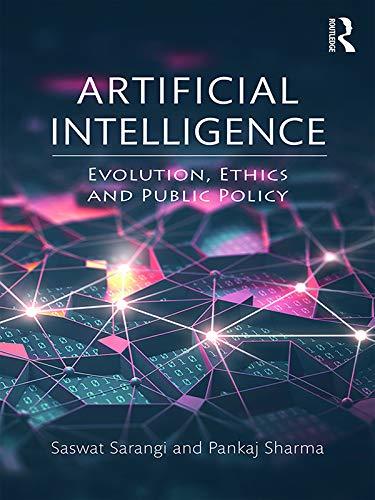
by Saswat Sarangi and Pankaj Sharma (2019)
This book traces the evolution of AI in contemporary history. It analyses how AI is primarily being driven by 'capital' as the only 'factor of production' and its consequences for the global political economy. It further explores the dystopian prospect of mass unemployment by AI and takes up the ethical aspects of AI and its possible use in undermining natural and fundamental rights.
Physical Book (avaiable in Centennial Library: Lower Level 2 - Q335 .S27 2019)


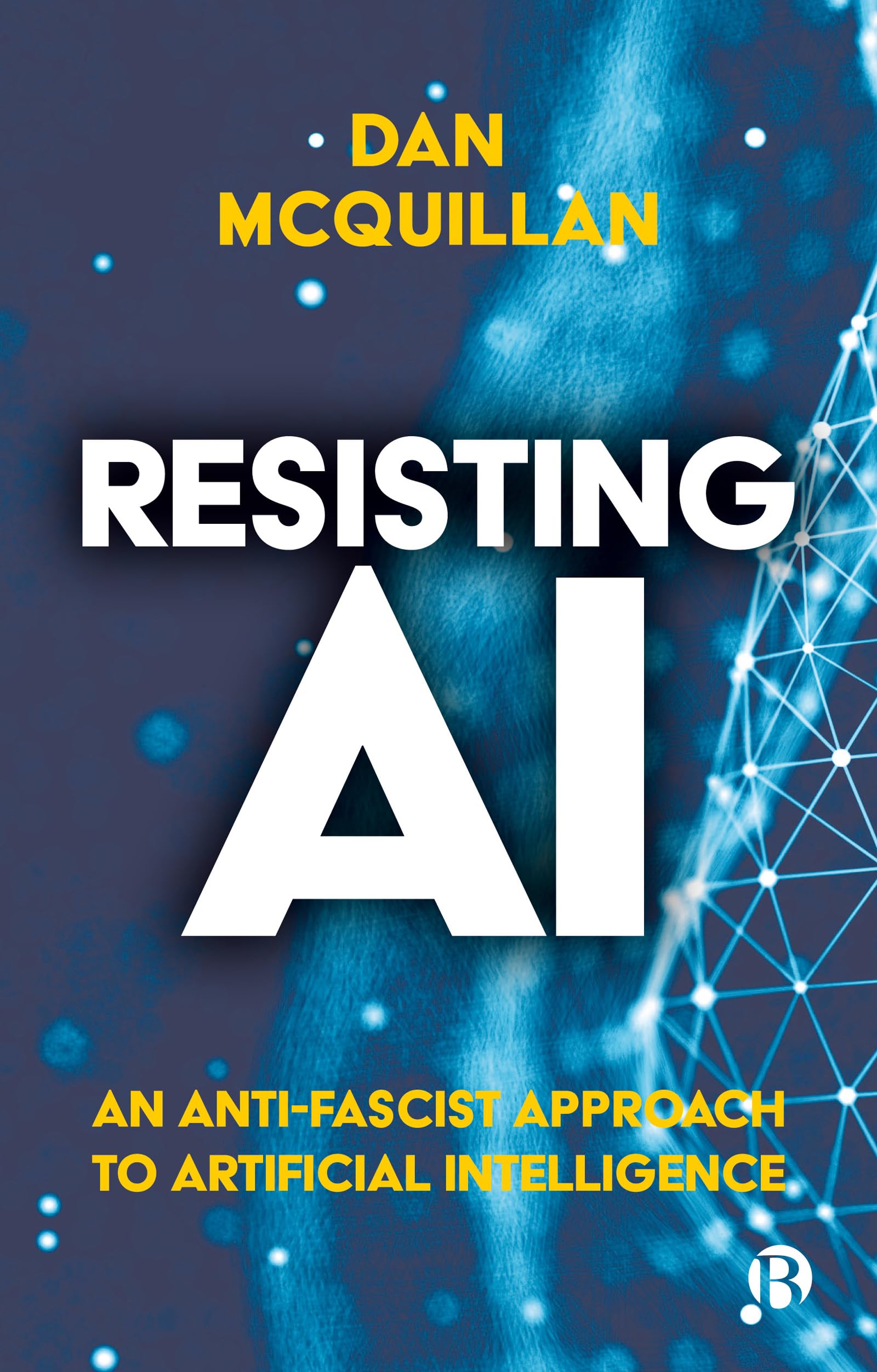 Artificial Intelligence (AI) is everywhere, yet it causes damage to society in ways that can’t be fixed. Instead of helping to address our current crises, AI causes divisions that limit people’s life chances, and even suggests fascistic solutions to social problems. This book provides an analysis of AI’s deep learning technology and its political effects and traces the ways that it resonates with contemporary political and social currents, from global austerity to the rise of the far right.
Artificial Intelligence (AI) is everywhere, yet it causes damage to society in ways that can’t be fixed. Instead of helping to address our current crises, AI causes divisions that limit people’s life chances, and even suggests fascistic solutions to social problems. This book provides an analysis of AI’s deep learning technology and its political effects and traces the ways that it resonates with contemporary political and social currents, from global austerity to the rise of the far right.